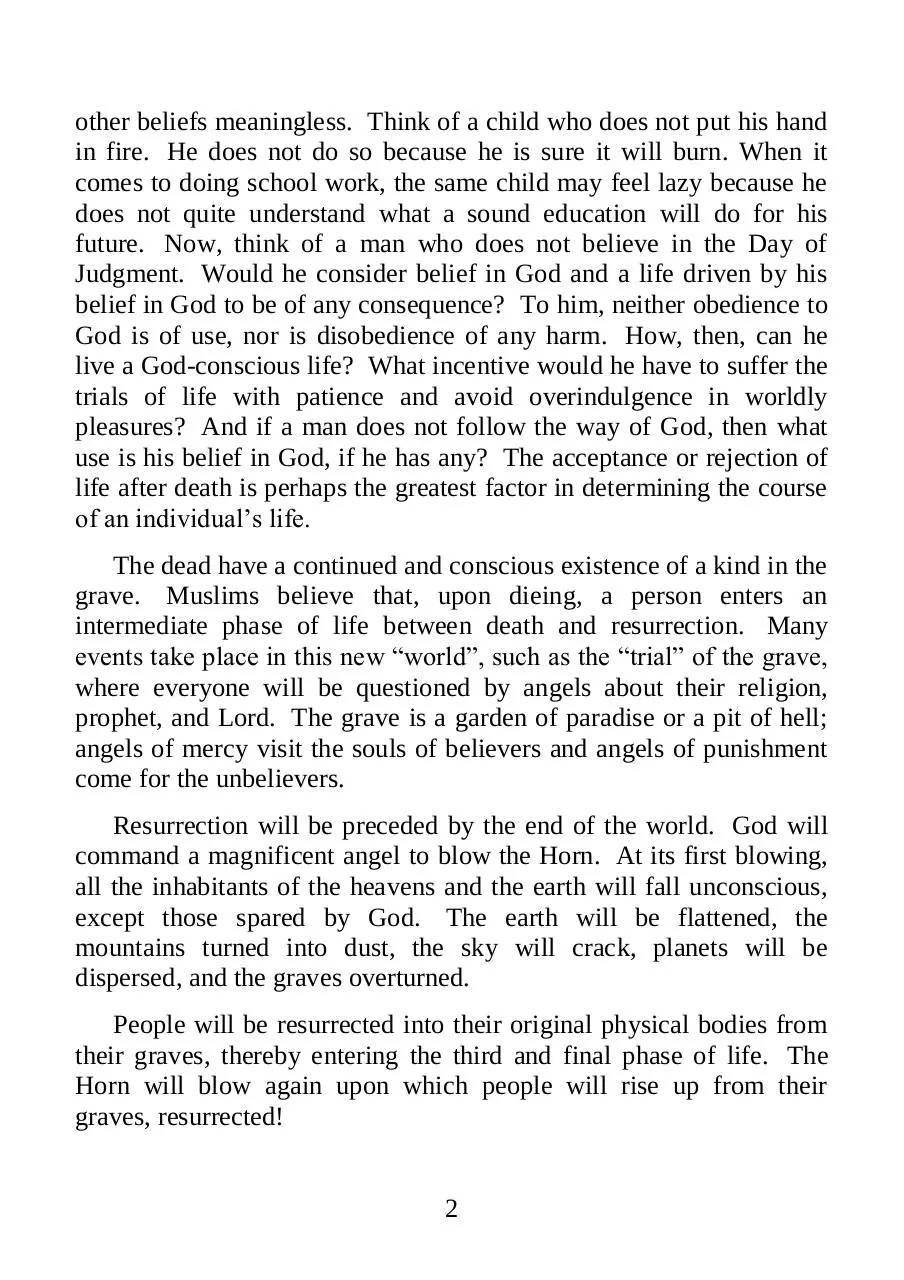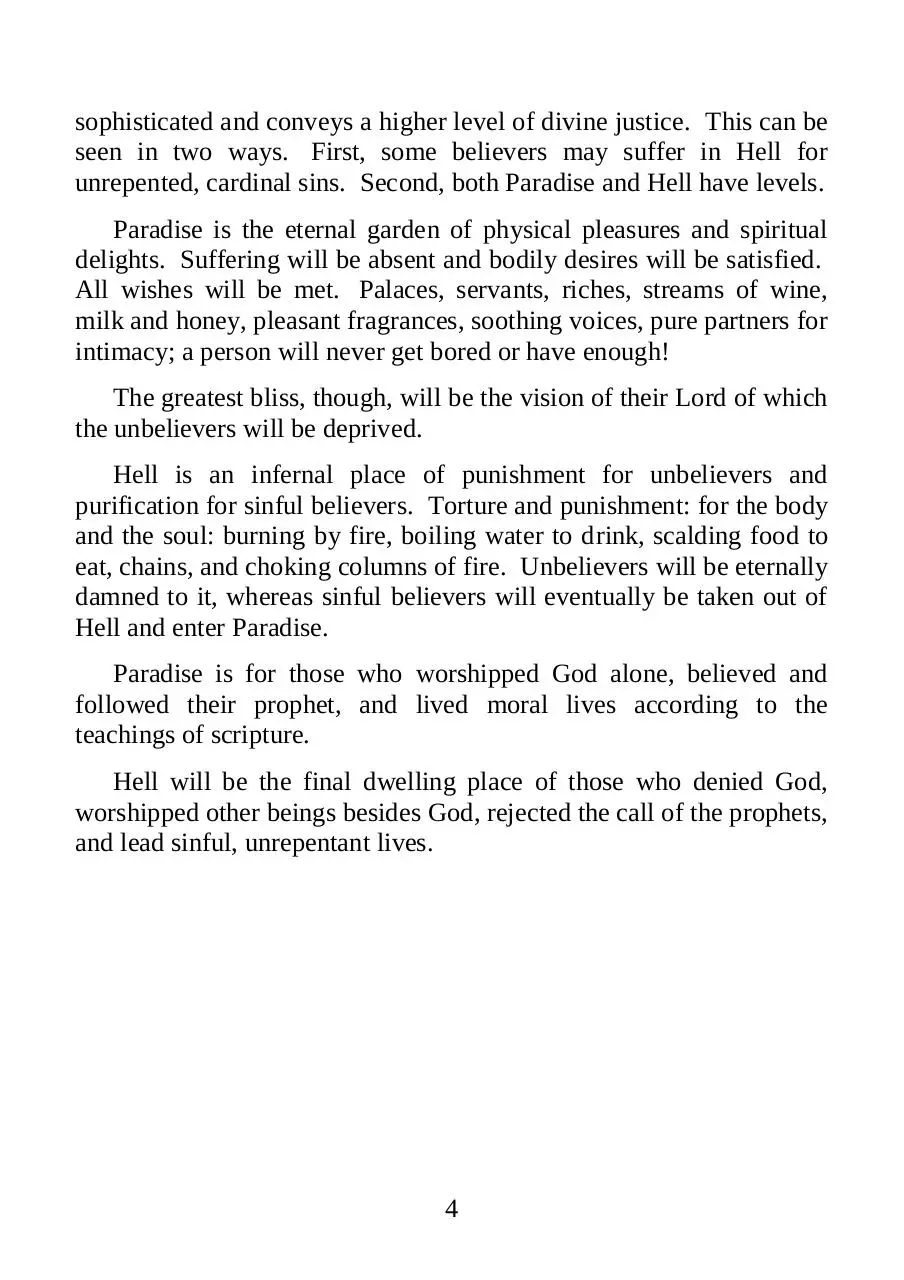en Death question (PDF)
File information
Title: Belief in Life after Death
Author: www.islamreligion.com website
This PDF 1.5 document has been generated by Microsoft® Word 2010, and has been sent on pdf-archive.com on 08/11/2015 at 15:51, from IP address 2.219.x.x.
The current document download page has been viewed 882 times.
File size: 331.72 KB (14 pages).
Privacy: public file





File preview
Life after Death
Everyone is scared of dying and rightly so. The uncertainty of
what lies beyond is frightening. It may be that of all religions, Islam
provides the most graphic details of what comes after death and lies
beyond. Islam views death to be a natural threshold to the next stage
of existence.
Islamic doctrine holds that human existence continues after the
death of the human body in the form of spiritual and physical
resurrection. There is a direct relation between conduct on earth and
the life beyond. The afterlife will be one of rewards and punishments
which are commensurate with earthily conduct. A Day will come
when God will resurrect and gather the first and the last of His
creation and judge everyone justly. People will enter their final
abode, Hell or Paradise. Faith in life after death urges us to do right
and to stay away from sin. In this life we sometimes see the pious
suffer and the impious enjoy. All shall be judged one day and justice
will be served.
Faith in life after death is one of the six fundamental beliefs
required of a Muslim to complete his faith. Rejecting it renders all
other beliefs meaningless. Think of a child who does not put his hand
in fire. He does not do so because he is sure it will burn. When it
comes to doing school work, the same child may feel lazy because he
does not quite understand what a sound education will do for his
future. Now, think of a man who does not believe in the Day of
Judgment. Would he consider belief in God and a life driven by his
belief in God to be of any consequence? To him, neither obedience to
God is of use, nor is disobedience of any harm. How, then, can he
live a God-conscious life? What incentive would he have to suffer the
trials of life with patience and avoid overindulgence in worldly
pleasures? And if a man does not follow the way of God, then what
use is his belief in God, if he has any? The acceptance or rejection of
life after death is perhaps the greatest factor in determining the course
of an individual’s life.
The dead have a continued and conscious existence of a kind in the
grave. Muslims believe that, upon dieing, a person enters an
intermediate phase of life between death and resurrection. Many
events take place in this new “world”, such as the “trial” of the grave,
where everyone will be questioned by angels about their religion,
prophet, and Lord. The grave is a garden of paradise or a pit of hell;
angels of mercy visit the souls of believers and angels of punishment
come for the unbelievers.
Resurrection will be preceded by the end of the world. God will
command a magnificent angel to blow the Horn. At its first blowing,
all the inhabitants of the heavens and the earth will fall unconscious,
except those spared by God. The earth will be flattened, the
mountains turned into dust, the sky will crack, planets will be
dispersed, and the graves overturned.
People will be resurrected into their original physical bodies from
their graves, thereby entering the third and final phase of life. The
Horn will blow again upon which people will rise up from their
graves, resurrected!
2
God will gather all humans, believers and the impious, jinns,
demons, even wild animals. It will be a universal gathering. The
angels will drive all human beings naked, uncircumcised, and barefooted to the Great Plain of Gathering. People will stand in wait for
judgment and humanity will sweat in agony. The righteous will be
sheltered under the shade of God’s Magnificent Throne.
When the condition becomes unbearable, people will request the
prophets and the messengers to intercede with God on their behalf to
save them from distress.
The balances will be set and the deeds of men will be weighed.
Disclosure of the Records of the deeds performed in this life will
follow. The one who will receive his record in his right hand will
have an easy reckoning. He will happily return to his family.
However, the person who will receive his record in his left hand
would wish he were dead as he will be thrown into the Fire. He will
be full of regrets and will wish that he were not handed his Record or
he had not known it.
Then God will judge His creation. They will be reminded and
informed of their good deeds and sins. The faithful will acknowledge
their failings and be forgiven. The disbelievers will have no good
deeds to declare because an unbeliever is rewarded for them in this
life. Some scholars are of the opinion that the punishment of an
unbeliever may be reduced in lieu of his good deeds, except the
punishment of the great sin of disbelief.
The Siraat is a bridge that will be established over Hell extending
to Paradise. Anyone who is steadfast on God’s religion in this life
will find it easy to pass it.
Paradise and Hell will be the final dwelling places for the faithful
and the damned after the Last Judgment. They are real and eternal.
The bliss of the people of Paradise shall never end and the punishment
of unbelievers condemned to Hell shall never cease. Unlike a passfail system in some other belief-systems, the Islamic view is more
3
sophisticated and conveys a higher level of divine justice. This can be
seen in two ways. First, some believers may suffer in Hell for
unrepented, cardinal sins. Second, both Paradise and Hell have levels.
Paradise is the eternal garden of physical pleasures and spiritual
delights. Suffering will be absent and bodily desires will be satisfied.
All wishes will be met. Palaces, servants, riches, streams of wine,
milk and honey, pleasant fragrances, soothing voices, pure partners for
intimacy; a person will never get bored or have enough!
The greatest bliss, though, will be the vision of their Lord of which
the unbelievers will be deprived.
Hell is an infernal place of punishment for unbelievers and
purification for sinful believers. Torture and punishment: for the body
and the soul: burning by fire, boiling water to drink, scalding food to
eat, chains, and choking columns of fire. Unbelievers will be eternally
damned to it, whereas sinful believers will eventually be taken out of
Hell and enter Paradise.
Paradise is for those who worshipped God alone, believed and
followed their prophet, and lived moral lives according to the
teachings of scripture.
Hell will be the final dwelling place of those who denied God,
worshipped other beings besides God, rejected the call of the prophets,
and lead sinful, unrepentant lives.
4
Belief in God
Introduction
At the heart of Islam lies belief in God.
The core of the Islamic creed is bearing witness to the phrase, La
illaha illa Allah, “There is no true deity deserving worship but God.”
The testimony to this belief, called tawhid, is the axis around which
all Islam revolves. Moreover, it is the first of the two testimonies by
which a person becomes a Muslim. Striving after the realization of
that oneness, or tawhid, is the core of Islamic life.
For many non-Muslims, the term Allah, the Arabic name of God,
refers to some distant and strange deity worshipped by the Arabs.
Some even think it to be some pagan “moon-god”. However, in
Arabic, the word Allah means the One True God. Even, Arabic
speaking Jews and Christians refer to the Supreme Being as Allah.
Finding God
Western philosophers, Eastern mystics as well as today’s scientists
attempt to reach God in their own way. Mystics teach of a God who is
5
found through spiritual experiences, a God who is part of the world
and resides within His creation. The philosophers seek God though
pure reason and often speak of a God as a detached Watch-Maker with
no interest in His creation. A group of philosophers teach
agnosticism, an ideology that holds that one can neither prove nor
disprove God's existence. Practically speaking, an agnostic asserts he
must be able to perceive God directly in order to have faith. God has
said:
“And those who are devoid of knowledge say: ‘Why does not God
speak unto us or why is not a [miraculous] sign shown to us?’ So said
the people before them words of similar import. Their hearts are all
alike...” (Quran 2:118)
The argument is nothing new; people in the past and present have
raised the same objection.
According to Islam, the correct way of finding God is through the
preserved teachings of the prophets. Islam maintains that the prophets
were sent by God Himself throughout the ages to guide human beings
to Him. God says in the Holy Quran that the correct path to belief is
to reflect upon His signs, which point to Him:
“…Indeed, We have made all the signs manifest unto people who
are endowed with inner certainty.” (Quran 2:118)
Mention of God’s handiwork occurs often in the Quran as the
locus of divine revelation. Anyone who sees the natural world in all
its wonder with open eyes and an open heart will see the unmistakable
signs of the Creator.
“Say: Go all over the earth and behold how [wondrously] He has
created [man] in the first instance: and thus, too, will God bring into
being your second life – for, verily, God has power to will anything.”
(Quran 20:29)
God’s handiwork is also present within the individual:
6
“And on earth there are signs [of God’s existence, visible] to all
who are endowed with inner certainty, just as [there are signs thereof]
within your own selves: can you not, then see?” (Quran 51:20-21)
The beauty and complexity of our universe. The Cone Nebula
pictured by NASA’s Hubble Space Telescope. (AP Photo/NASA)
Belief in God in Islam consists of four matters:
i. Belief in God’s existence.
ii. God is the Supreme Lord.
iii. God Alone is entitled to worship.
iv. God is known by His Most Beautiful Names and Attributes.
(I)
Belief in God’s Existence
God’s existence does not require proof by scientific, mathematical,
or philosophical arguments. His existence is not a ‘discovery’ to be
made by the scientific method or a mathematical theorem to be
proven. Simply said, mere common sense bears witness to God’s
7
existence. From a ship one learns of the ship-builder, from the
cosmos one learns of its Creator. God’s existence is also known by
answers to prayers, miracles of prophets and the teaching in all
revealed scriptures.
In Islam, a human being is not seen as sinful creature to whom the
message of Heaven is sent to heal the wound of original sin, but as a
being who still carries his primordial nature (al-fitrah), an imprint on
his soul that lies deeply buried under layers of negligence. Humans
are not born sinful, but forgetful as God has said:
“…Am I not your Lord? They said: ‘Yes, we bear witness...’”
(Quran 7:172)
In this verse, the “they” refers to all human beings, male and
female. The ‘yes’ confirms the affirmation of God’s oneness by us in
our precosmic state. Islamic doctrine holds that men and women still
carry the echo of this ‘yes’ deep down within their souls. The call of
Islam is directed to this primordial nature, which uttered ‘yes’ even
before they inhabited the earth. Knowledge that this universe has a
Creator is something instinctive in Islam and therefore it requires no
proof. Scientists, such as Andrew Newberg and Eugene D’Aquili,
both affiliated with the University of Pennsylvania and pioneers in the
neurological research of religion, say “We are wired for God.” 1
The Holy Quran rhetorically asks:
“…Can there be any doubt about God, the Creator of the heavens
and the earth?...” (Quran 14:10)
One might ask, ‘if belief in God is natural, then why do some
people lack this belief?’ The answer is simple. Every human being
has an innate belief in a Creator, but this belief is not a result of
learning or personal deductive thinking. With the passage of time,
outside influences effect this innate belief and confuse the person. So,
1“Why God Won’t Go Away”. Science and the Biology of Belief, p. 107.
8
one’s environment and upbringing veil the primordial nature from the
truth. The Prophet of Islam, may God praise all, said:
“Every child is born in a state of fitrah (a natural belief in God),
then his parents make him a Jew, a Christian, or a Magian.” (Saheeh
Muslim)
Often these veils are lifted when a human being is faced with a
spiritual crisis and left helpless and vulnerable.
(II) God Is the Supreme Lord
God is the only Lord of heaven and earth. He is the Lord of the
physical universe and the Lawgiver for human life. He is the Master
of the physical world and Ruler of the affairs of men. God is the Lord
of every man, woman, and child. Historically, only a few have denied
the existence of the Lord, which means that throughout the ages
people have, for most part, believed in One God, a Supreme Being, a
supernatural Creator. That God is the Lord specifically contains the
following meanings:
First, God is the sole Lord and Ruler of the physical world. Lord
means He is the Creator, Controller, and Owner of the Kingdom of the
heaven and the earth; they belong exclusively to Him. He alone
brought existence out of non-existence, and all existence depends on
Him for its conservation and continuance. He did not create the
universe and leave it to pursue its own course according to fixed laws,
thereafter ceasing to take any further interest in it. The power of the
Living God is required at every moment to sustain all creatures.
Creation has no Lord besides Him.
“Say (O Muhammad): ‘Who provides for you from the sky and the
earth? Or who owns hearing and sight? And who brings out the
living from the dead and brings out the dead from the living? And
who disposes the affairs?’ They will say: ‘God.’ Say: ‘Will you not
9
Download en Death question
en_Death question.pdf (PDF, 331.72 KB)
Download PDF
Share this file on social networks
Link to this page
Permanent link
Use the permanent link to the download page to share your document on Facebook, Twitter, LinkedIn, or directly with a contact by e-Mail, Messenger, Whatsapp, Line..
Short link
Use the short link to share your document on Twitter or by text message (SMS)
HTML Code
Copy the following HTML code to share your document on a Website or Blog
QR Code to this page

This file has been shared publicly by a user of PDF Archive.
Document ID: 0000313510.